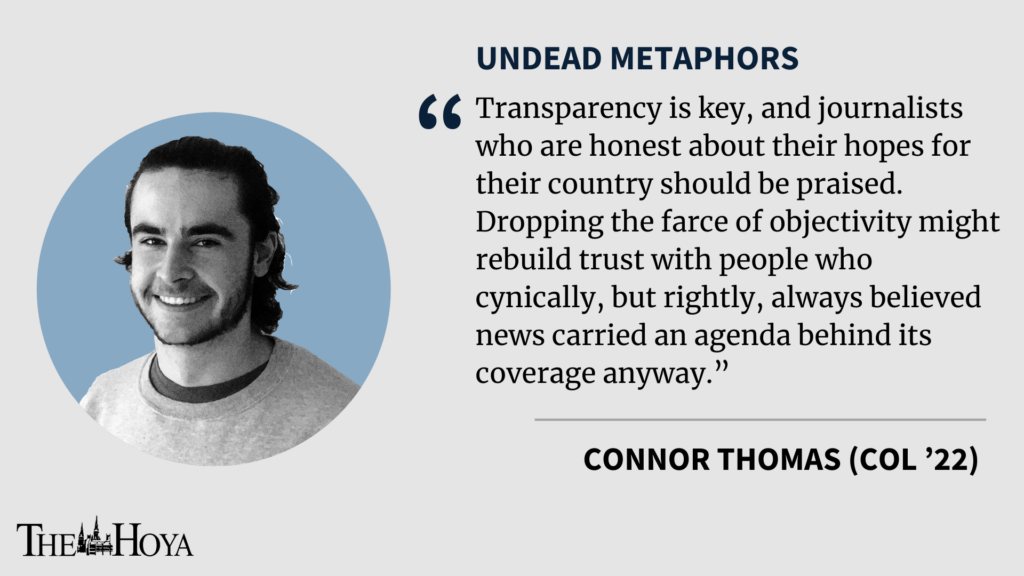George Romero’s 1978 classic zombie flick “Dawn of the Dead” opens on a broadcast newsroom in chaos — in other words, a newsroom. The zombie apocalypse is well underway, and the channel has been airing a list of rescue stations for people to take shelter. But, as shelters are overrun by zombies, the information is quickly becoming outdated.
Looking at the current list, our main character realizes what the news is unintentionally doing by sending people to inoperative rescue stations and discusses the problem with her producers. One of the producers responds by saying, “I’m doin’ what I can. These are definite as of now.” But by relying on old information, the newsroom is manufacturing new zombies.
Journalistic objectivity is one of the oldest ideals in the business. Although news organizations have upheld it for nearly 100 years as the defining characteristic of newsmaking, whenever I hear it invoked, I can’t help but suspect a zombie. As with free speech, now is the time not to abandon or devalue objectivity but to update our thinking about it.
I would wager that most newsmakers see no problem with believing both that every reporter comes at a story from a particular point of view and that every reporter must be objective. Have an angle, but be objective: the contradictory rule of thumb.
The problem is that the objective, disinterested perspective does not exist. In 1974, Thomas Nagel famously asked the question, “What is it like to be a bat?” sparking more debate — some of it zombie themed — than can be parsed into 750 words. Nagel invited the reader to try to imagine a bat’s experience of the world with the bet that they would fall up short.
The important part for journalists is that Nagel rejected the idea that a scientific — read: objective — investigator would be able to fully replicate or adopt another being’s perspective, and vice versa. Third-person narrators only really exist in fiction, or as Hunter S. Thompson put it, there will never be “free lunch, final wisdom, total coverage.”
This truth is unfortunate news for reporters who fancy themselves as authorities on things. But the upshot is that once these reporters accept that they cannot give the definitive account of an event, the creative liberty latent in the profession emerges: journalism with an objective.
Practicing journalism with an objective and with care breathes new life into the unfortunately undead metaphor of objectivity. To publish news that makes the world a better place is a better goal than objectivity for its own sake. The issue is that, when misused and overused by members of the media, objectivity renders coverage inert.
There is a quote often misattributed to Philip Graham, former publisher of The Washington Post, that calls news “the first rough draft of history.” Although it highlights the enduring importance of journalism, this proverb evokes the idea that journalists are third-person narrators, somehow outside of history.
But as reporters, it is our job to advocate as much as it is to record. Too much dispassionate recording turns readers from potential political actors into passive spectators, a disaster for social and political movements in this country.
Journalists do not need to legitimize shady and dishonest people in the name of objectivity. Doing so amounts to repressive tolerance. Many times, powerful people and corporations can shirk accountability by sending news media sterile statements reminiscent of the Glomar response.
No amount of hostility to Glomarization overstates the case against it. Glomarization is when an entity, usually governmental, can “neither confirm nor deny” the existence or nonexistence of some information, an undead response the government has authorized itself to give in response to journalists seeking documents under the Freedom of Information Act.
Too often, the news shows both sides by reporting statements — from people, governments, corporations or organizations — that say nothing, zombifying readers who think they are seeing someone being held accountable.
We can partially resolve the issue by consuming news with a more critical eye, but relying on readers to be on guard for bad-faith actors is asking readers to do journalists’ jobs for them. Opportunists like Senate Minority Leader Mitch McConnell (R-Ky.) have not hesitated to weaponize journalism that takes a “view from nowhere.”
Practicing journalism with an objective reaffirms the importance of angles and advocacy. Some of this already exists in the news analysis columns or among investigative journalists, at outlets like Vox and those transparently advocating a certain political agenda.
Transparency is key, and journalists who are honest about their hopes for their country should be praised. Dropping the farce of objectivity might rebuild trust with people who cynically, but rightly, always believed news carried an agenda behind its coverage anyway.
The duty to publish facts, and the need to consider the consequences of publishing those facts remains the central conflict at newsrooms from “Dawn of the Dead” to The Washington Post, where “Democracy Dies in Darkness.” When journalists fetishize objectivity as some enlightening force beyond dispute, the concern for the impacts of their reporting can fall by the wayside.
Like bats, those ignoble model journalists, we reporters cannot see the world as it is, but our voices realize it all the same.
Connor Thomas is a junior in the College. Undead Metaphors appears online every other Friday.









